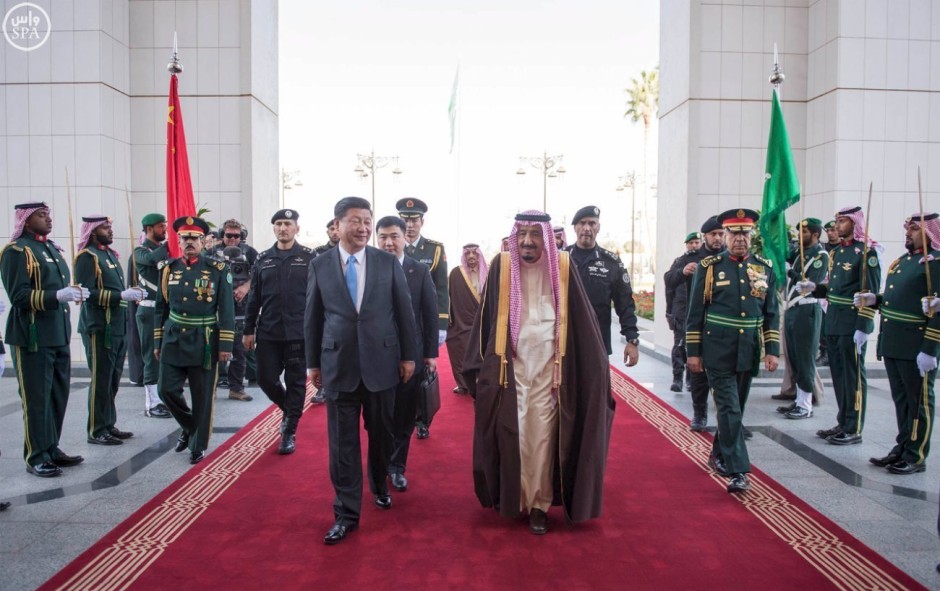Chinese President Xi Jinping recently visited Saudi Arabia, Egypt and Iran. The central object of his trip was to promote the Belt and Road Initiative, which will revive the ancient Silk Road.
“Since China and Saudi Arabia forged diplomatic ties 26 years ago, our relationship has developed by leaps and bounds, with mutual political trust deepening continuously and rich results in co-operation in various fields,” Xi said upon his arrival in Riyadh in January.
“I believe that my visit will be a friendly trip with fruitful achievements, thus conducive to lifting our co-operation in various fields to a new level,” he added.
China is the world’s largest oil importer and gets more than half of its crude from the region. Saudi Arabia has been China’s biggest supplier, and bilateral trade reached $69.1 billion in 2014.
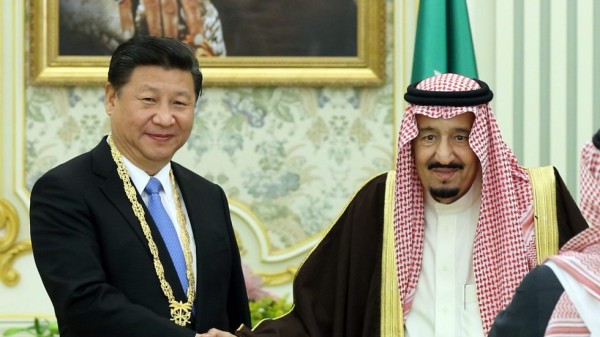
Xi and King Salman inaugurated an energy research centre in Riyadh and opened the Yasref oil refinery, a joint venture between Saudi Aramco and China’s Sinopec.
The official Saudi Press Agency reported that the two companies signed a framework agreement for strategic cooperation and that the Saudi and Chinese governments had signed a memorandum of understanding to build a high-energy nuclear reactor.
In Egypt Xi, together with Egyptian President Abdel Fattah al-Sisi, Xi inspected the China-Egypt Suez Economic and Trade Cooperation Zone, which is near the Suez Canal and 120 kilometers away from Cairo.
The first phase, already completed, is an international industrial base which covers industrial projects, including processing and manufacturing, logistics, protective tariff, technological development, commerce and trade, and modern services.
Xi said that 32 Chinese companies were now working in the economic zone, investing more than $400 million, and these figures would rise to 100 firms and $2.5 billion in the second phase of the project, creating about 40,000 jobs for Egyptians.
“China supports Egypt’s efforts to maintain stability, develop the economy and improve livelihoods,” Xi stated.
Officials from the two countries signed 21 deals at a ceremony in Cairo, including a $1 billion financing agreement for Egypt’s central bank and a $700 million loan to the state-owned National Bank of Egypt for financing medium and small projects.
China and Egypt are also planning 15 projects in electricity, infrastructure and transport with investments that could total $15 billion, Xi added.
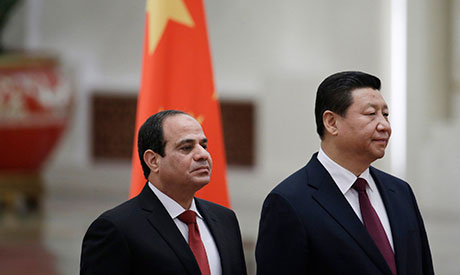
Four months earlier, President Sisi had visited Beijing and emphasized just how seriously Egypt’s new government is about deepening ties with China. The China State Construction Engineering Corporation agreed to build and finance part of a new administrative capital that will be built to the east of Cairo.
Sisi’s government expects the project to cost $45 billion over the next five to seven years. When finished, it will include government agencies and the president’s office as well as a new airport.
China is now Egypt’s largest trading partner, with bilateral trade worth $11 billion. Like many of China’s trading partners, however, Egypt is concerned about just how imbalanced that trade is.
Egyptian Trade and Industry Minister Mounir Fakhry Abdel Nour told the Xinhua News Agency that Chinese exports to Egypt account of $10.5 billion out of that $11 billion.
“We are working hard to increase our exports to China and urge for opening the Chinese markets for our industrial and agricultural exports,” Nour remarked. He also said that Egypt would seek to encourage more Chinese investment.
In December 2014, during an earlier trip to China by Sisi, China and Egypt upgraded their relationship to a “comprehensive strategic partnership” and a number of projects were announced, including the construction of a power plant in Suez Province and a new electric rail project to link Tenth of Ramadan City in Sharqia to Cairo.
The last leg of Xi’s trip was to Iran, which China views as a vital geographic link between China and Europe.
“We are Iran’s biggest trading partner for six years in a row,” Xi wrote in an open letter to the Iranian people. “China has considerable strength in capital, technologies, equipment and other areas. Iran has rich resources, ample labor force and huge market potential, and it is in the crucial stage of industrialization and modernization.”
Chinese state companies are active all over the country. In Tehran, the Chinese have been involved in the construction of a huge elevated expressway and the building of the Niayesh Tunnel, which at more than three and a half miles will be one of the longest urban tunnels in the world.
The city’s metro system was built from scratch, starting in 1995, with Chinese capital and Chinese engineers. The train cars that run on it are Chinese, too. A Chinese-built steel mill recently went into operation.
“Westerners visiting the capital often wonder how we managed to pull off such ambitious projects during the heaviest sanction regime in history,” explained Mohammad Reza Sabzalipour, Iran’s World Trade Center representative. “Well, we did it with the help of our Chinese friends.”
Now that western sanctions have been lifted, Iran’s economy will undoubtedly expand. While Xi was in Tehran, both countries agreed to increase trade to $600 billion in the coming decade.
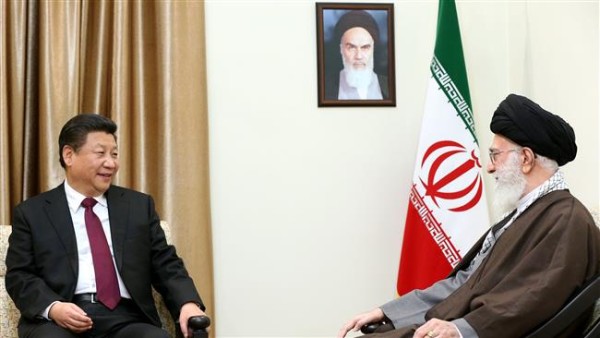
Iran’s supreme leader, Ayatollah Ali Khameini told Xi that “Iranians had never trusted the West.” That was why Iran was seeking more cooperation with “independent countries.”
On this basis, stated Khameini, “the agreement between the presidents of Iran and China for the establishment of a 25-year strategic relationship is completely correct and wise.” He added, “Iran will never forget China’s cooperation during the time of sanctions.”
That same month, though, hundreds of businessmen attended a China-Israel trade summit in Beijing.
Amir Gal-Or, founder and head of Infinity Group, a China-Israel private equity firm, spoke about long-term innovation cooperation between China and Israel.
He reminded listeners at the first ever China-Israel Technology, Innovation, and Investment Summit that both countries have viewed entrepreneurship as a key future growth strategy.
About 40 percent of all venture capital flowing into Israel came from China in 2015, according to Ziva Eger, chief executive of the Foreign Investments and industrial Cooperation division at the Israeli Ministry of Economy and Industry.

“2016 will be much bigger than that,” she added, and may even double.
Lionel Friedfeld and Philippe Metoudi, authors of the 2015 book Israel and China: From Silk Road to Innovation Highway, contend that the two countries are perfect partners in this new era of globalization.
They share strong and complementary competitive advantages, with Israel contributing technology and innovation and China providing robust financial and manufacturing capability.
The recent establishment of Guangdong Technion-Israel Institute of Technology, a partnership between China’s Shantou University and the Israel’s Technion, is a prime example of the attempt by the two countries to cooperate in higher education, training students in research and development.
Israel excels in fields where Chinese technology eagerly looks for breakthroughs. Modern agriculture, medical devices, and cyber security are among the sectors in which China is interested in developing partnerships.
Alibaba Group Holding Limited, the Chinese company that provides consumer-to-consumer, business-to-consumer and business-to-business sales services via web portals, last year became an investor of the Israel-based venture fund Jerusalem Venture Partners, a venture capital firm known for its interest in cyber security.
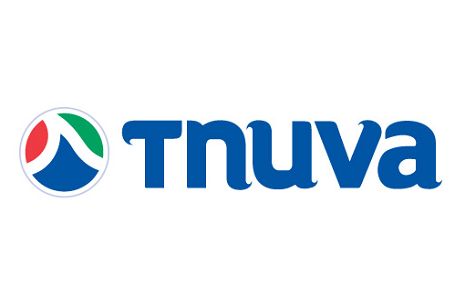
China’s Bright Food closed a deal in 2015 to purchase a majority stake in Israeli dairy giant Tnuva.
And Fosun International, one of China’s biggest private conglomerates, acquired Israeli medical device firm Alma Lasers in 2013.
Israeli companies partnering with Chinese ones gain more than venture capital. “It’s not only about money, remarked Ophir Gore, head of the trade mission at the Israeli Embassy in Beijing. “It’s getting access to the Chinese market.”
Greater trade with China would also diminish the leverage Europe uses in its attempts to compel Israel to accept European Middle East policy, noted Alon Levkowitz, a research associate at the Begin-Sadat Center for Strategic Studies in Ramat Gan, Israel.
To facilitate economic cooperation in the Middle East and elsewhere, in 2014 China founded the Asian Infrastructure Investment Bank (AIIB) as a counterweight to the U.S.-dominated World Bank. Egypt and Saudi Arabia, together with Iran, were founding members, and Israel joined last year.
Henry Srebrnik is a professor of political science at the University of Prince Edward Island.

